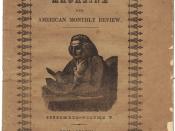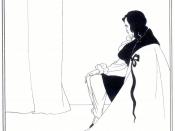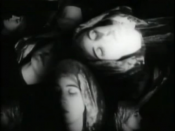James Dimitrov Analysis of "The Fall of the House of Usher"� Edgar Allan Poe's short story, "The Fall of the House of Usher"� may seem to be a story about an insane man who, after the death of his sister, looses what is left of his mind and, thus, caused his own demise. However, there is a far greater meaning behind the actual house in the short story. Some readers may have read about a house where "there appeared to be a wild inconsistency between its still perfect adaptation of parts, and the crumbling condition of the individual stones"� (Poe 294). The house, however, is actually an image of Roderick Usher's mind. The "inconsistencies"� that Poe mentions are actually the beginning of the house's downfall, and the downfall of Roderick Usher himself.
The House of Usher is "in allegorical fact, the physical body of Roderick Usher, and its dim interior is, in fact, Roderick Usher's visionary mind" (Wilbur 107).
This can be seen from the very beginning of the story, when the narrator describes the house as having "vacant and eye-like windows"� (Poe 292). Later on, Poe compares the "eyes"� of the house to the eyes of both Usher and the narrator. The narrator describes that "the eye, however, struggled in vain to reach the remoter angles of the chamber, or the recesses of the vaulted and fretted ceiling"� (Poe 295). The narrator refers to his own eve inside the house, thus making a comparison between his eyes, and the windows of the house itself. The narrator continues by stating the Roderick Usher has "a cadaverousness of complexion; an eye large, liquid, and luminous beyond comparison"� (Poe 295). Literary critic Mia Radford states that "There are many symbols that Poe uses in "The Fall of...


